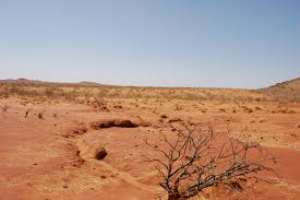
Accra, July 25, GNA - Government representatives and experts meeting at the Food Agriculture Organization (FAO) in Rome, on Thursday endorsed global plans of action to halt the escalating degradation of soils.
They warned that urgent action is required to improve the health of the world's limited soil resources, and stop land degradation, so as to ensure that future generations have enough supplies of food, water, energy and raw materials.
The Global Soil Partnership has endorsed a series of action plans at its on-going plenary Assembly in Rome, to safeguard soil resources which provide the basis for global agricultural production.
A statement issued by Peter Mayer of the FAO Media Relations in Rome and copied to the Ghana News Agency, said recommendations include the implementation of strong regulations and corresponding investments by governments for the sustainable management of soils in ways that contribute to the eradication of hunger, food insecurity and poverty.
"Soil is the basis for food, feed, fuel and fibre production," said Maria Helena Semedo, FAO Deputy Director-General.
"Without soil we cannot sustain life on earth and where soil is lost it cannot be renewed on a human timeline. The current escalating rate of soil degradation threatens the capacity of future generations to meet their needs.
"That's why the adoption of Global Plans of Action to sustainably use and protect soils is a major achievement. But we cannot stop here. We need commitments from countries and civil society to put the plan into reality. This requires political will and investments to save the precious soil resources our food production systems depend on," Semedo said.
The experts at the three-day meeting warned that the area of productive soils in the world is limited, and faces increasing pressure from competing uses, such as cropping, forestry and pastures/range land, urbanization, as well as energy production and mineral extraction.
The statement said soils represent at least a quarter of global biodiversity, and play a key role in the supply of clean water and resilience to floods and drought.
It said, crucially, plant and animal life depend on primary nutrient recycling through soil processes.
While some parts of Africa and South America offer scope for expansion in Agriculture, according to FAO, global population which is expected to exceed nine billion by 2050 - resulting in a 60 per cent increase in the demand for food, feed and fibre - would put an even greater strain on land resources.
It said some 33 per cent of soil is moderately to highly degraded due to erosion, nutrient depletion, acidification, salinization, compaction and chemical pollution.
According to the FAO, the resulting damage to soil affects livelihoods, ecosystem services, food security and human well-being.
The statement said soils are also both affected by, and may contribute to climate change, adding that sustainable management of soil resources could impact positively on climate change through carbon sequestration and a reduction of green house gas emissions, and also by mitigating desertification processes.
The Global Soil Partnership, which brings together a broad range of government and non-government stakeholders, stresses the increasing need for governments to preserve soils and make the necessary investments.
It noted that the global soil community decided to establish global programmes for the promotion of sustainable soil management, soil conservation and soil restoration.
The statement said interventions should be based on the use of suitable technologies and sustainable and inclusive policies that directly involve local communities in actions to protect soils.
It said in particular, there is a need to prioritize the safeguarding and management of organic carbon rich soils, notably peat lands and permafrost areas.
GNA EN-GB X-NONE X-NONE




 'Kill whoever will rig Ejisu by-election' – Independent Candidate supporters inv...
'Kill whoever will rig Ejisu by-election' – Independent Candidate supporters inv...
 Ashanti Region: ‘Apologize to me for claiming I owe electricity bills else... – ...
Ashanti Region: ‘Apologize to me for claiming I owe electricity bills else... – ...
 Ghana is a mess; citizens will stand for their party even if they’re dying — Kof...
Ghana is a mess; citizens will stand for their party even if they’re dying — Kof...
 Internet shutdown an abuse of human rights — CSOs to gov't
Internet shutdown an abuse of human rights — CSOs to gov't
 Free SHS policy: Eating Tom Brown in the morning, afternoon, evening will be a t...
Free SHS policy: Eating Tom Brown in the morning, afternoon, evening will be a t...
 Dumsor: A British energy expert 'lied' Ghanaians, causing us to abandon energy p...
Dumsor: A British energy expert 'lied' Ghanaians, causing us to abandon energy p...
 What a speech! — Imani Africa boss reacts to Prof. Opoku Agyemang’s presentation
What a speech! — Imani Africa boss reacts to Prof. Opoku Agyemang’s presentation
 Dumsor: Tell us the truth — Atik Mohammed to ECG
Dumsor: Tell us the truth — Atik Mohammed to ECG
 Dumsor: Don't rush to demand timetable; the problem may be temporary — Atik Moha...
Dumsor: Don't rush to demand timetable; the problem may be temporary — Atik Moha...
 Space X Starlink’s satellite broadband approved in Ghana — NCA
Space X Starlink’s satellite broadband approved in Ghana — NCA
